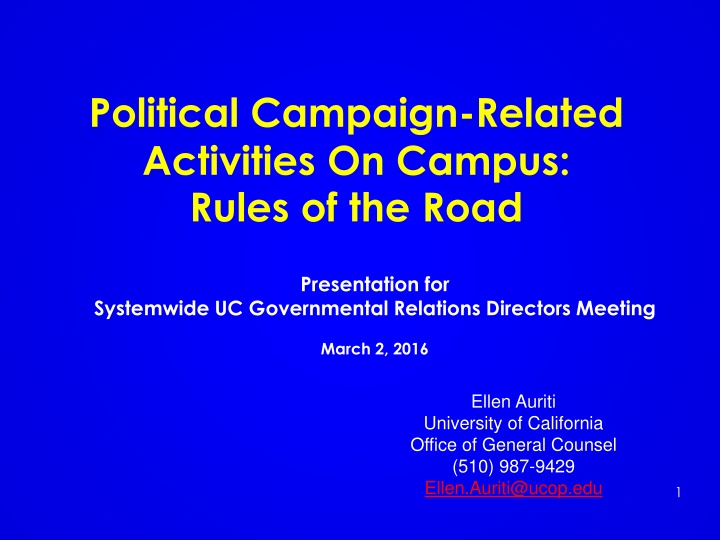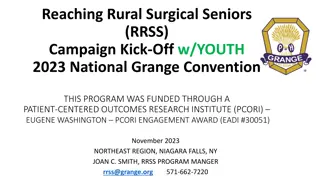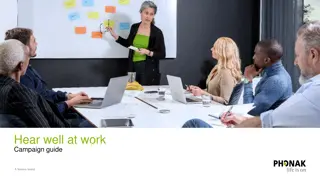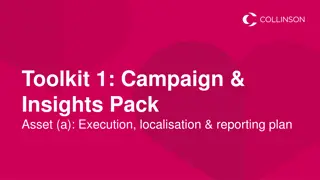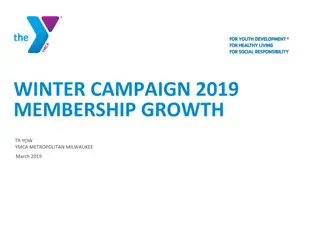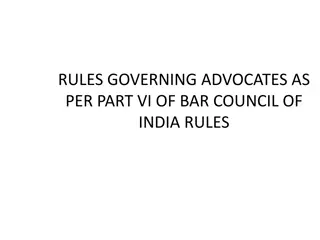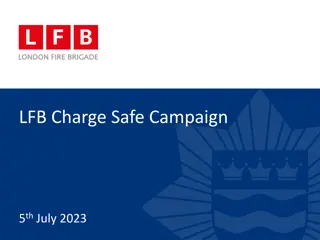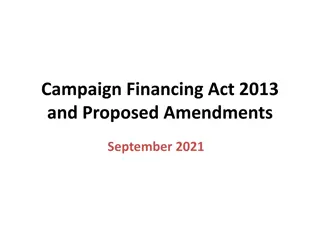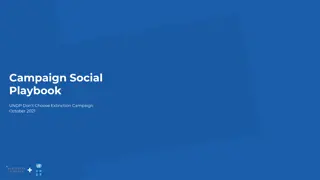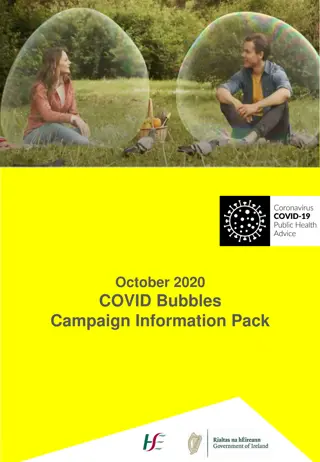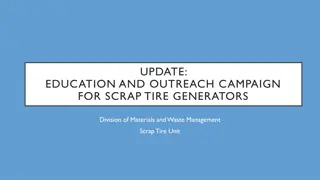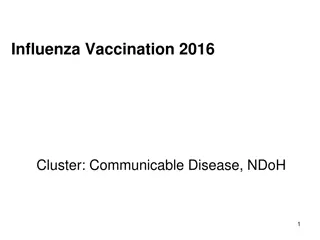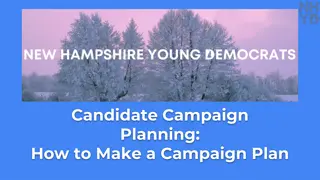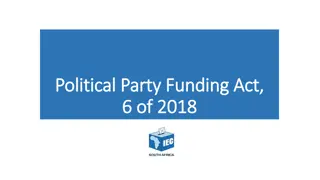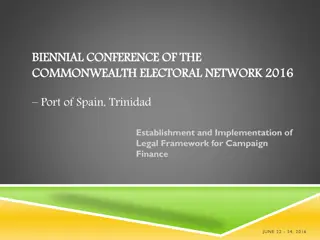Rules and Restrictions on Political Campaign Activities in University Settings
Presentation covers legal restrictions on political campaigning in university settings, including IRS rules for 501(c)(3) organizations, state agency regulations, and distinctions between permissible and impermissible activities. Restrictions include prohibiting endorsing/opposing candidates, contributing to campaigns, and advocating on ballot measures.
Download Presentation

Please find below an Image/Link to download the presentation.
The content on the website is provided AS IS for your information and personal use only. It may not be sold, licensed, or shared on other websites without obtaining consent from the author.If you encounter any issues during the download, it is possible that the publisher has removed the file from their server.
You are allowed to download the files provided on this website for personal or commercial use, subject to the condition that they are used lawfully. All files are the property of their respective owners.
The content on the website is provided AS IS for your information and personal use only. It may not be sold, licensed, or shared on other websites without obtaining consent from the author.
E N D
Presentation Transcript
Political Campaign-Related Activities On Campus: Rules of the Road Presentation for Systemwide UC Governmental Relations Directors Meeting March 2, 2016 Ellen Auriti University of California Office of General Counsel (510) 987-9429 Ellen.Auriti@ucop.edu 1
Another Election Year. What Do We Need to Know? Legal Restrictions on Political Campaigning - Candidates and Ballot Initiatives - Private Activity versus UC Activity - Use of University/State Resources Permissible Activities UC Policy/Guidance: Use of UC Resources & Facilities Use of UC name, seal, title Relations of UC staff with State and Fed l Officials 2
Overview: Campaign Advocacy Restrictions on UC involvement in campaign activities are based on UC status as 501(c)(3) and as state agency As a 501(c)(3) charity: (I.R.S. rules; tax-exempt status) UC may not endorse/oppose (or contribute to) candidates UC may engage in direct and grassroots legislative lobbying, as long as it remains an insubstantial (~5%) part of UC s activities Non-partisan activities (hosting debates; voter registration drives) are OK, if consistent with tax-exempt purpose As a state agency: (CA regulations & case law: Stanson v. Mott (1976); Vargas v. City of Salinas (2009)) UC may not advocate on measures that qualified for the ballot The Regents may adopt a position on a measure in an open meeting, where all sides have opportunity to be heard Distinction between informational activities (OK) and advocacy/campaigning (not OK!) 3
Legal Restrictions: IRS Rules (applicable to 501(c)(3) charitable organizations) Prohibition on political campaign intervention (electioneering) for/against candidates for public office. Includes: Making/distributing public statements supporting or opposing candidates Contributing (funds, resources) to political campaigns Violations may result in revocation of tax-exempt status and imposition of certain taxes Applicable to: University activities overall; Activities of University staff /faculty in their capacity as representatives of the University; Activities conducted by campus Foundations and other Section 501(c)(3) organizations affiliated with UC 4
Legal Restrictions: State Agencies Restriction on Ballot Measure Advocacy: Ban on campaigning for/against ballot measures that have qualified for ballot (Stanson v. Mott line of cases); Applicable to: University activities; Activities of University staff /faculty in their capacity as representatives of the University; Activities that make non-incidental use of University/state resources: Funds, UC-paid time, equipment, materials, facilities Ban does not apply to: Legitimate informational activities (distinguished from unlawful campaign activities ) Private activities of individual employees (using non-UC resources) Alumni Associations/Campus Foundations (* but see caveats) Restriction on use of state/UC resources for campaign or personal activity not authorized by law (See Gov. Code Section 8314) 5
Legal Restrictions: Potential consequences for violations of state rules Potential criminal and civil penalties for misuse of public resources Public official may need to reimburse agency from personal funds But a public official who, in good faith, authorizes the improper expenditure of public funds is personally liable to replace such funds only if he failed to exercise due care (Stanson v. Mott). May trigger reporting obligations under state Political Reform Act. Penalties for agencies that fail to report Negative PR; Reputational risk Discrediting or Diluting Effectiveness of UC research 6
Who May be Watching? Fair Political Practices Commission CA Attorney General CA Secretary of State I.R.S. Reporters/public inquiries 7
Information or Advocacy? No hard and fast rules Courts will look to style, tenor, and timing Permissible Informational activities: Provide fair presentation of the facts (both sides); Use objective, non-inflammatory language; Do not urge voters to vote for/against a measure; Deliver info thru regular channels. Caution: Context counts! Even a communication that avoids explicitly urging a yes/no vote could be considered improper campaigning (e.g., special mailing close to election). 8
UC or Private Individual Activity? Individual employees have constitutional right to engage in private political activities: On their own time (still must devote full time/attention to job) Without using public/UC resources (limited minor incidental use may be OK, but best practice: use only personal resources) Record-keeping as appropriate (use of vacation or other leave; reimbursement to UC if non- incidental use of resources) Must take care to avoid confusion re: official/private roles 9
Individual Activities: Use of UC Title May a University employee endorse a ballot measure in his/her private capacity and identify himself/ herself by University title? Yes. A University official may allow use of his/her name and title for identification purposes in the same manner as others who sign an endorsement. An express disclaimer of University endorsement is required only where the context might reasonably cause confusion as to whether the endorsement is made in an official or unofficial capacity. e.g., Title for identification purposes only; this endorsement is made in a personal capacity and does not represent the views of UC. Presidents, Chancellors, Deans a disclaimer is almost always appropriate 10
Campus Foundations and Alumni Associations Subject to IRS restrictions on campaign intervention for/against candidates (if 501(c)(3) entities); Not subject to same state agency restrictions; So: May participate in campaign activities on ballot measures, BUT: May not use public/UC resources (including paid UC staff or funds from UC accounts) Subject to 501(c)(3) limits Subject to donor restrictions on use of donated funds Must report to FPPC donations of funds/services to a ballot measure campaign Per UC policy, may only make campaign expenditures to support ballot measures that have been endorsed by The Regents and that are clearly beneficial to UC.
Examples of Permissible Activities (ballot measures) Adoption by The Regents of a position on a ballot measure (at an open public meeting) Preparing objective analyses of the impact/effect of a measure on UC and higher education Responding to inquiries about the Regents position in a way that provides a fair representation of the facts about the measure UC employees endorsing a ballot measure (e.g., in an op-ed) in their personal/private capacity (caveats: without non-incidental use of UC resources; disclaimer advisable if reasonable potential for confusion) 12
Examples of Permissible Activities (other campaign-related activities) VOTER REGISTRATION DRIVES, VOTER EDUCATION: Permissible, as long as non-partisan, not favoring any party or candidate. HOSTING NEUTRAL PUBLIC FORUMS (to which all legally qualified candidates are invited and given equal access) INVITING CANDIDATES TO APPEAR IN A NON-CANDIDATE CAPACITY (caveat: should not reference election or allow campaigning at the event) GENUINE CURRICULAR ACTIVITIES aimed at educating students about the political process (caveat: UC activity must be non-partisan) UC EMPLOYEES ENGAGING IN FEDERAL CAMPAIGN-RELATED ACTIVITIES IN THEIR PERSONAL/PRIVATE CAPACITY (caveat: without non-incidental use of UC resources; disclaimer advisable if reasonable potential for confusion) 13
Examples of Impermissible activities ENDORSING OR CONTRIBUTING TO CANDIDATES. UC may not endorse or contribute to candidates for elective office. Institutional officials should use care to avoid confusion between private and public roles. SPENDING UC RESOURCES ON ADVOCACY FOR/AGAINST BALLOT INITATIVES that have qualified for the ballot. DISSEMINATING BALLOT INITIATIVE OR CANDIDATE ADVOCACY MATERIALS (even if prepared by others); PROVIDING CANDIDATES A FORUM TO PROMOTE THEIR CAMPAIGN, particularly if all candidates are not given the same forum/access on the same terms. PUBLISHING RATINGS OF CANDIDATES, particularly if the ratings could be perceived as reflecting the views of the institution, and/or if institutional resources are used. 14
What May Cross the Line into Impermissible Campaigning? Special UC mailing (or web posting) close to election: Proposition XYZ will promote student health and help stamp out obesity. Your support in November is crucial. UC Social Media (e.g.,Facebook) campaign: A vote for Prop ABC is a vote against Big Tobacco. (Slogan .) UC web pages linking to one side of a campaign: Remember to vote on Prop XYZ, and including link only to the Yes on Prop XYZ Campaign. 15
UC Policy/Guidance: Ballot Campaigns: UC Legal Guidelines http://www.ucop.edu/state-governmental-relations/advocacy/legal-guidelines-ballot- campaigns.html University funds (including University paid time and equipment) may not lawfully be used for campaign purposes in connection with ballot propositions. University funds may be used for legitimate informational activities. These guidelines are intended to assist in drawing the difficult distinction between legitimate informational activities and unlawful campaign activities. Focus on use of University resources (Funds, paid time, equipment, materials, facilities) Distinguish between legitimate informational activities and unlawful campaign activities Apply to University activities, not to private activities of individual employees (w/o UC resources) 16
UC Policy/Guidance: Restrictions on Use of UC Resources & Facilities for Political Activities http://policy.ucop.edu/doc/1200368/FacilPolitActiv - UC name, insignia, seal may not be used in connection with political activity except as consistent with University regulations; -In statements re: political issues, University titles shall be used only for identification (disclaimer needed if use of title might reasonably be construed as implying UC support/endorsement); -No non-incidental use of University resources for political activities; - A distinction must be drawn between political activity on the one hand, and instruction and research on politically related subjects on the other; certainly, scholarly instruction and research on politics is not only appropriate but desirable. There must be an examination of all the facts and circumstances - No University facility shall be used for political activities other than those open discussion and meeting areas provided for in campus regs 17
UC Policy/Guidance: Policy on Use of University Properties http://policy.ucop.edu/doc/2710524/PACAOS-40 -41.00 All individuals or organizations using UC properties and services must avoid any unauthorized implication that they are sponsored, endorsed or favored by the University; -41.10 As a State instrumentality, UC must remain neutral on religious and political matters. -41.12 Use of University titles in non-official correspondence, statements, media (need for disclaimer if identification might reasonably be construed as implying UC support, endorsement or opposition to political, commercial or religious activity or issue); -41.20 Use of University Name, Insignia, Seal, or Address (not to be used in connection with political purposes except as consistent with UC policy and applicable law). 18
UC Policy/Guidance: Policy on Relations of University Staff Members with State and Federal Officials http://policy.ucop.edu/doc/6000437/ReltnswFedStateOfficials -Employees may not give appearance of acting on behalf of the University when communicating with State or Federal officials unless authorized to do so; -When corresponding with State and Federal officials, University letterhead should be used only when the writer is representing the University; letters expressing personal views should be written on personal stationery. - UC s Sacramento Office or Washington Office, respectively, should be notified in advance re: visits to Sac to or Washington in connection with UC business. When appropriate, an informal report of the results of such visits shall be sent to these offices as soon as possible. -When employees give opinions as independent professionals, they must state clearly that they are speaking for themselves and not on behalf of the University of California. Check Campus Time, Place, Manner regulations 19
Key Takeaways DON T: In official UC role, advocate for/against ballot initiatives that have qualified for the ballot, or for/against political candidates; Use UC resources (or permit them to be used) for political advocacy or for improper personal purposes; Use UC letterhead, email, or UC title in a way that implies official UC endorsement (without authorization); DO: Contact campus/UC Government Relations office prior to visits with/communication with government officials (or regarding communications on ballot initiatives); Consult with Campus Counsel/OGC if you have questions about whether an activity or proposed communication might cross the line into impermissible campaigning. 20
Resources ACE Guidelines: Political Campaign-Related Activities of and at Colleges and Universities (September, 2014) http://www.acenet.edu/news-room/Documents/Memo-Political-Campaigns.pdf IRS Fact Sheet 2006-17: Election Year Activities and the Prohibition on Campaign Intervention for 501(c)(3) organizations https://www.irs.gov/uac/Election-Year-Activities-and-the-Prohibition-on- Political-Campaign-Intervention-for-Section-501(c)(3)-Organizations IRS Rev. Ruling 2007-41 (Includes higher ed examples of whether organization s activities violate 501(c)(3) rules re: political campaign activities): https://www.irs.gov/irb/2007-25_IRB/ar09.html IRS FAQs about the Ban on Political Campaigning by 501(c)(3) org s: http://www.irs.gov/pub/irs-tege/501c3_polcampfaqs.pdf UC Guidelines re: Participation in Ballot Initiative Campaigns: http://www.ucop.edu/state-governmental-relations/advocacy/legal- guidelines-ballot-campaigns.html Political Reform Act. Ca. Gov Code 81000 et seq. CA Supreme Court cases: Stanson v. Mott ((1976) 17 Cal.3d 206; Vargas v. Salinas (2009) 46 Cal.4th 1 21
QUESTIONS 22
